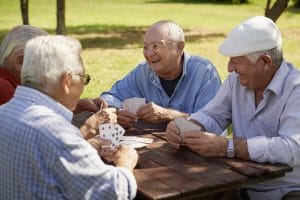The resolution to learn something new everyday is certainly one many of us aspire to; when it comes to the aging brain, it can become a matter of critical importance. “As adults we have these well-trodden paths in our synapses,” says Kathleen Taylor, expert in the neuropsychology of adult learning. “We have to crack the cognitive egg and scramble it up … to help (the) brain keep developing.”
This concept of pushing the brain out of its comfort zone to stimulate activity is the driving principle behind our use of cognitive rehabilitation therapy (CRT) in our LCB communities. Often prescribed to retrain post-stroke or brain-injured patients, CRT involves skill-based learning meant to create new neural pathways and thereby help strengthen cognitive function – particularly in the areas of concentration, focus, and memory. Central to this concept is the tool of novel learning – that is, teaching the brain an entirely new skill or knowledge area, as opposed to simply brushing up on abilities or fact sets that are already familiar.
In collaboration with Harvard Medical School, our staff CRT into what we call our Four Pillars of Engagement – physical, cognitive, emotional, and social – as part of our ongoing commitment to create engaging environments that promote healthy cognitive function. Our approach is echoed in the growing research body linking robust brain activity with the delay of age-related dementia symptoms. So, on a given day at LCB, you might see an activities director leading a group of seniors through a mock house-hunting project – researching locations, assessing available housing stock, and comparing market values – then leaving to attend actual open houses, and ultimately deciding on which house they’d purchase and why. Or you might pass by a cluster of community members surfing the web with one of our residential engagement directors, learning how to navigate between websites, copy and paste links, and bookmark their favorites.
Under the guidance of our Harvard Medical School colleagues, our staff uses the Montreal Cognitive Assessment Tool to help track the progress of community members participating in CRT, starting at move-in and then repeating the assessment at two week intervals, followed by three months, and then six months. We look for – and see, in the vast majority – signs of progress in the areas of memory, focus, executive functioning, and concentration.
If you’re interested in hearing more about CRT and the results we’ve seen in our communities, Reflections and Engagement Manager Joshua Freitas would love to talk to you! You can reach Josh at 781-619-9320, or email him at jfreitas@lcbseniorliving.com

